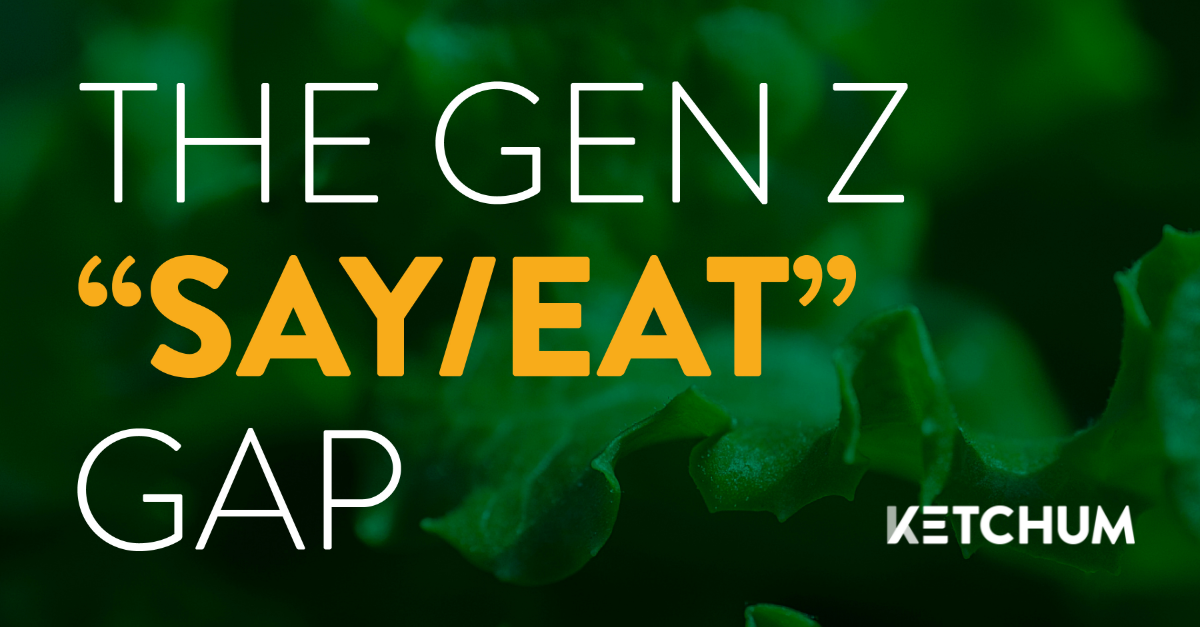Ketchum Food Research Reveals the Pressure on Gen Z to Show Their Values Through Food
NEW YORK (August 15, 2023) —Gen Z has been deemed the foodie generation, but recent research from Ketchum reveals a darker side to their relationship with food. Sixty-one percent of Gen Z has felt pressure on them since childhood to eat a certain way to communicate their identity and beliefs, which has created negativity and anxiety among this food-obsessed generation.
The wide-ranging research study from global communications consultancy Ketchum expands upon its legacy of food insights, intelligence and landmark research by examining the attitudes and beliefs of Gen Z about food. It builds upon Ketchum’s Food 2020 research which defined approximately one-quarter of the population as Food eVangelists, influential consumers seeking to change the food system. Ketchum’s newest food research reveals that approximately half of Gen Zers are classified as Food eVangelists, which is significantly higher than the general population, signaling increased engagement with food systems. Three key themes that offer new perspectives on Gen Z’s relationship with food have also emerged.
A stressed-out generation feels the pressure
More than all other generations, 63% of Gen Zers feel too much pressure to change the world and are more likely to believe their food choices need to signal their health, values and political beliefs. This has contributed to 62% of Gen Z who think their eating pattern is wrong. These unrealistic pressures have also created a “say-eat gap” between Gen Z’s beliefs and behaviors. An overwhelming majority of Gen Z says that sustainability, animal welfare and LGBTQ rights are important factors when buying food, but they are not significant purchase drivers. Other priorities like taste, value and affordability trump issues that are important to them.
“Since early childhood, this generation has seen food politicized and been taught to choose food products related to values,” said Melissa Kinch, president, Ketchum’s Food Consultancy. “They are exhausted and acting very differently from previous generations. It has left them feeling insecure and negative about cooking and food. In particular, the contrast between what they say is important and how they spend their money is eye-opening.”
Social media is a source of inspiration and anxiety
These digital natives are food obsessed and enjoy experimenting in the kitchen, cooking new dishes and exploring new cuisines. Gen Z scrolls TikTok, YouTube and Instagram and follows social media influencers for recipe ideas and inspiration. However, 67% worry they spend too much time on social media, and 58% believe that social media has a negative impact on their body image. They are also more likely than other generations to say that food makes them feel guilty, anxious, uncomfortable and overwhelmed. But Gen Zers remain optimistic, and most want food to make them happy, relaxed, healthy and confident.
Forging their food future
Despite the pressures on them, Gen Zers are doing things their way. Sixty-eight percent cook differently from their parents, and most eat differently, too. Fifty-five percent of Gen Zers piece together snacks into a meal weekly, validating the popularity of the #girldinner. However, in survey results that challenge the naming of this TikTok trend, Gen Z men and women are “snackifying” meals equally.
“If food companies and brands want to connect with Gen Z successfully, they should consider the impact of virtue signaling and tap into Gen Z’s quest for stability to show ways their products can bring joy,” said Kinch. “Scrolling through TikTok validates the innovation and creativity Gen Z brings to the category, and food companies who collaborate with them will increase brand love and build loyalty.”
To learn more about Ketchum’s findings on Gen Z’s relationship with food and to download a copy of the report with the full results, visit https://www.ketchum.com/gen-z-food-report/.
Methodology
To identify what sets Gen Z’s food habits apart from the generations before them, Ketchum Analytics conducted a 15-minute survey among 2,000 nationally representative U.S. children and adults ages 13+. The survey was fielded from 4/7 – 4/18 with margins of error at 95% confidence level.
About Ketchum
Established in 1923, Ketchum’s century of continuous evolution is a testament to our progress. Our storied journey is fueled by our guiding principles of empathy and intelligence. Progress allows us to create a thriving environment where we embrace innovation and deliver excellence with our people and partners, producing work that matters. Driven by data, we develop culture-first work at the intersection of industry and capability. With 136 Cannes Lions, our global consultancy is one of the most creatively awarded firms in our industry. We are Ketchum: Progress at Work. For more information on Ketchum, a part of Omnicom Public Relations Group, visit www.ketchum.com.
About Omnicom Public Relations Group
Omnicom Public Relations Group is a global collective of three of the top global public relations agencies worldwide and specialist agencies in areas including public affairs, language strategy, global health strategy and change management. As the largest group of communications professionals in the world, our employees provide expertise to companies, government agencies, NGOs, and nonprofits across a wide range of industries. Omnicom Public Relations Group delivers for clients through a relentless focus on talent, continuous pursuit of innovation, and a culture steeped in collaboration. Omnicom Public Relations Group is part of the Communications Consultancy Network, a division of Omnicom Group Inc. (NYSE: OMC).
###
